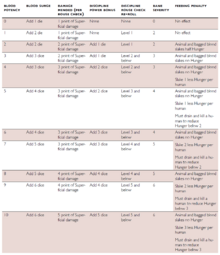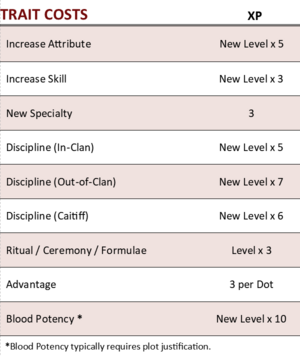Character Creation
CORE CONCEPT
What was your character’s name in life? What did they do? Where and when were they Embraced? What is their name now? Where are they now? Write your character’s name on the Relationship Map.
- Ambition: Think of Ambition as a long-term goal: an aspiration (if you still breathed), a life’s dream (if you still dreamed, or had life). An Ambition must be measurable in game terms or a concrete achievement in the world of the chronicle. At the end of a session in which the character has actively worked toward their Ambition, they recover one point of Aggravated Willpower damage.
- Desire: Desires are more immediate: short-term wishes for revenge, satisfaction, or satisfaction through revenge. Each session, a character can select a Desire or keep their unfulfilled Desire from the previous session. Once per session, when the character definitively acts to further or accomplish their Desire, they may immediately recover one point of Superficial Willpower damage.
CLAN & SIRE
Pick your clan. Write your character’s sire on the Relationship Map along with relevant sect SPCs.
ATTRIBUTES
- Take one Attribute at 4
- Take three Attributes at 3
- Take four Attributes at 2
- Take one Attribute at 1
- Health = Stamina + 3
(Fill in the remaining squares)
- Willpower = Composure + Resolve
(Fill in the remaining squares)
SKILLS
Pick one Skill distribution.
- Jack of All Trades: One Skill at 3, eight Skills at 2, ten Skills at 1
- Balanced: Three Skills at 3, five Skills at 2, seven Skills at 1
- Specialist: One Skill at 4, three Skills at 3, three Skills at 2, three Skills at 1
Add free specialties to Academics, Craft, Performance, and Science Skills that you may have.
Take one more free specialty in any Skill you have.
DISCIPLINES
- Choose two of your clan Disciplines. Put two dots in one and one dot in the other.
- Note: Only at Level 1, Blood Sorcery nets one free ritual, and Oblivion nets one free Ceremony. All future rituals and ceremonies must be purchased with XP.
- For Caitiff, choose any two Disciplines. Put two dots in one and one dot in the other.
- Thin-bloods have no intrinsic Disciplines.
PREDATOR TYPE
- Pick your Predator Type.
- Add one of the listed specialties.
- Add one dot to a listed Discipline.
- Apply any associated Advantages or Flaws.
ADVANTAGES
- Spend 7 points on Advantages, and take 2 points of Flaws in addition to the ones gained from your Predator type.
- Points can also be spent on Lore Sheets. Characters may only use one Lore Sheet at a time, but may also have a secondary "Bloodline" sheet. Sheets listed as "Descendant of..." may also count as Bloodlines, per Storyteller approval.
- Thin-bloods must take between one and three Thin-Blood Merits and the same number of Thin-Blood Flaws,
- Each player also gains 1 point for Coterie creation. Players may also contribute their characters' own Advantage points to the Coterie creation pool. See Coterie Type for additional purchasable packages.
CONVICTIONS & TOUCHSTONES
- Decide upon three (or more) Chronicle Tenets as a group. These apply to all player characters in a chronicle, even if the character doesn’t hold this belief personally. The Tenets comprise a kind of ethical ground floor, so that decisions carry a cost. A list of example Tenets can be found here.
- Select one to three Convictions for your character.
- Create an equal number of Touchstones, each connected to one Conviction, and add them to the Relationship Map. Your Touchstones must living mortals. Your Touchstones may only be animals, objects, places, or rituals with express Storyteller permission (i.e. Achors).
EXPERIENCE POINTS
Characters who survive the dangers of the night improve their chances of surviving the next one. We represent this Darwinian process of learning and improvement with experience points.
The Storyteller awards each player 2 experience points per session played, plus 2 additional points at the end of each story. Players spend their points to improve their characters’ Traits or acquire specialties (p. 159) according to the Trait Cost chart in the Characters chapter on p. 151.
Storytellers may insist that players have their characters take action in the course of the game to make any improvements, not just Merits, plausible.
The cost of a dot varies depending on what type of dot it is and how many dots you already have in that Trait. The Trait Costs table provides these costs. “New level” on that table means the level of Trait you want to buy. For example, if you want to go from two dots of Composure (••) to three dots of Composure (•••), you need to pay 15 experience points, because Composure 3 x 5 = 15.
You cannot skip ahead and buy four dots of Composure (••••) for 20 points if you currently only have two dots of Composure (••). You need to first buy the third dot of Composure (•••) for 15 experience points, then buy four dots of Composure (••••) for 20.
The only sequential exception are Lore Sheets, where levels may be purchased in any order. However, they do still cost 3 experience points per dot.
In order to spend experience points on Disciplines, a character usually needs to feed on the matching Resonance (see p. 226). To later learn a completely new Discipline that is not one of their Clan Disciplines, the character also needs to taste the Blood of someone who possess it.
Every time a character gains a dot in a Discipline they choose one power from among the listed, either from their new Discipline level or below. Vampire characters normally have an equal number of dots and powers in a Discipline - no more, no less.

